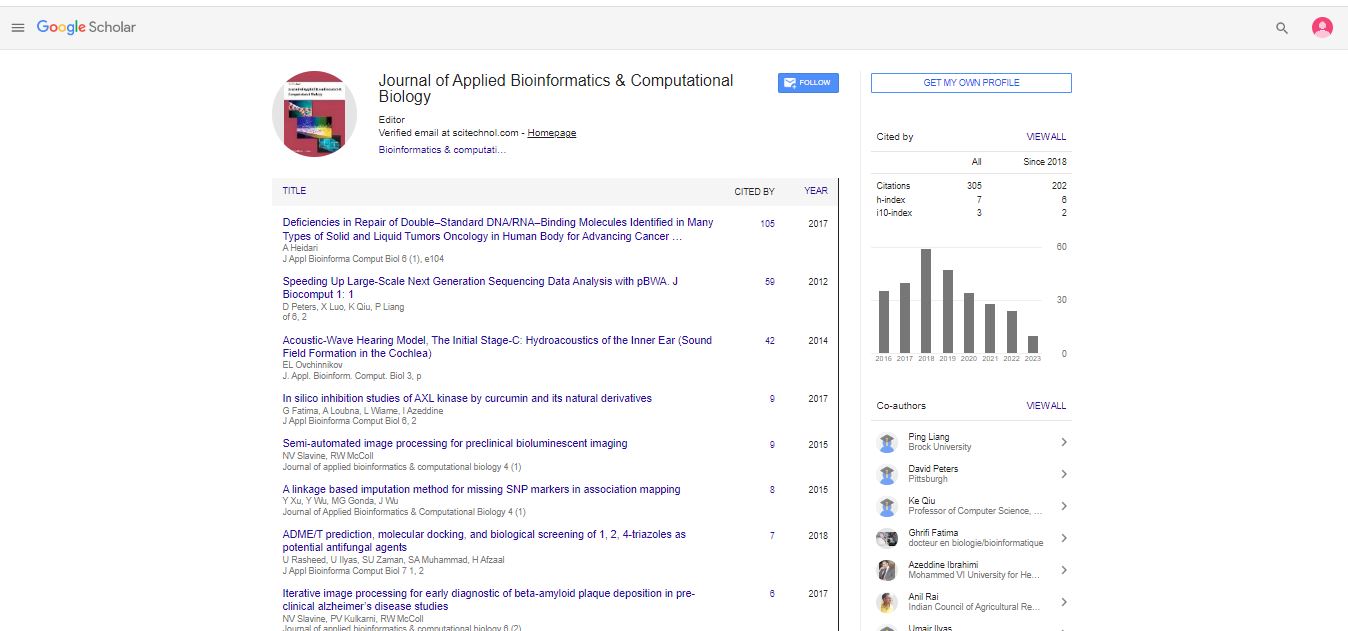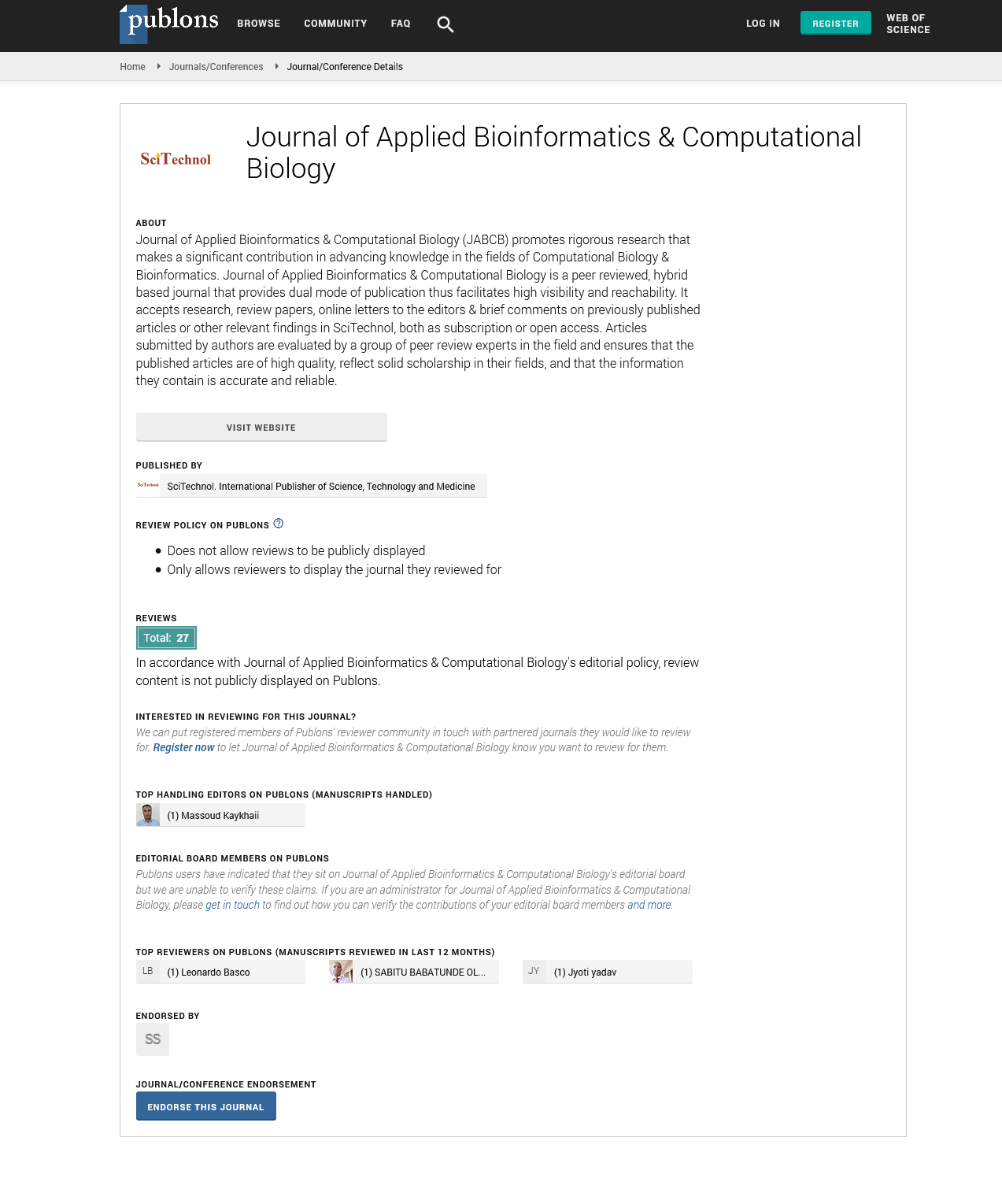Commentary, J Appl Bioinforma Comput Biol Vol: 11 Issue: 5
Epigenetics in Regenerative Medicine and Intellectual Impairment
Mateus Assmann *
Department of Medicine, University of Maine, Orono, USA
*Corresponding author: Mateus Assmann
Department of Medicine, University of Maine, Orono, USA
E-mail: mateus@gmail.com
Received date: 19 April, 2022, Manuscript No. JABCB-22-67889;
Editor assigned date: 21 April, 2022, PreQC No. JABCB-22-67889 (PQ);
Reviewed date: 05 May, 2022, QC No. JABCB-22-67889;
Revised date: 12 May, 2022, Manuscript No. JABCB-22-67889 (R);
Published date: 19 May, 2022, DOI: 10.4172/2329-9533.1000234
Citation: Assmann M (2022) Epigenetics in Regenerative Medicine and Intellectual Impairment. J Appl Bioinforma Comput Biol 11:5.
Keywords: Regenerative Medicine
Description
Epigenetics plays a profound role in traditional cellular processes, and alterations to traditional epigenetic processes cause composition malleability and illness progression, prompting widespread interest in understanding the interactions between the epigenome, the genome, and also the setting. As such, epigenetic identification in twins affords the chance to know epigenetic variation and also the relationship between genotype, phenotype, and external environmental factors. The appearance of whole-genome epigenetic identification approaches is revolutionizing our ability to interrogate the epigenome. Here, we tend to describe the best-studied epigenetic mechanisms, together with deoxyribonucleic acid methylation, simple protein modifications, and body substance structure and also the ways to profile these epigenetic processes. we tend to concentrate on deoxyribonucleic acid methylation because the most generally studied of the epigenetic mechanisms in twin studies. We offer associate degree in-depth review of bioinformatics ways to judge and live epigenetic datasets. Concentrate on genome-wide epigenetic identification in twins guarantees to reveal the impact of epigenetic alterations in illness.
Dynamics Management
Epigenetic dynamics management cell fate determination and cellular selections. Repressing or activating marks lead to body substance transforming and either upregulation or downregulation of targeted genes. The primary unidirectional bifurcation step in development is ruled by epigenetic call of whether or not the cells plan to placental fate or embryonic fate, and once the cells area unit committed to at least one fate over the opposite, a continuation of epigenetic selections takes place for cell varieties and lineage specifications. Later in development, many adult cells like satellite stem cells still build epigenetic selections supported metabolic cues, injury repair mechanism, and aging effects. Epigenetic regulation happens by varied enzymes that write, read, and erase epigenetic marks, resulting in body substance transforming and management of organic phenomenon, or noncoding RNAs, that play an important half in aged adult stem cells. the continued and intensive study of epigenetic dysregulation in tissues like muscle and brain will lend themselves as a place to begin for tissues that the scientific community has however to tackle, like exocrine gland development, aging, and degeneration. To combat human diseases, scientists area unit targeting epigenetic regulative inhibitors toward applicable epigenetic fronts together with hESCs and iPSCs, traditional and abnormal differentiation (disease in an exceedingly dish), vessel and neurodegenerative diseases, and eventually, cancer and response diseases. whereas some epigenetic restrictive medicine area unit already obtainable for clinical use, diagnosis epigenetic tools like EpiRegulator and CRISPR/Cas9-gRNA supply preciseness and targeted epigenetic transforming to revert misguided organic phenomenon and cellular selections and treat medical conditions.
Epigenetic alterations play a key role within the initiation, progression, and metastasis of cancer. Therefore, epigenetic marks and mechanisms area unit potential biomarkers for preciseness medication in cancer. Considering the substantial role of the epigenetic alterations in deoxyribonucleic acid methylation, miRNA expression, and posttranslational modifications in histones in large intestine cancer initiation and progression, worldwide analysis has known new epigenetic biomarker for CRC diagnosing, prognosis, and prediction of treatment response, of that some are approved and area unit presently being commercialised. During this chapter, we offer an outline of the foremost promising epigenetic biomarkers and describe commercially obtainable epigenetic-based in vitro diagnostic tests for CRC which will truly be enforced into clinical follow.
Epigenetic processes will contribute to ID in 2 basically completely different ways: through abnormal epigenetic regulation of specific genes or body regions, or via mutations that disrupt specific epigenetic regulators. Abnormal epigenetic silencing happens within the ester repeat disorder Fragile X syndrome and within the learning disorders Angelman syndrome and Prader–Willi syndrome. In these disorders, underlying deoxyribonucleic acid changes lead to associate degree altered epigenetic state resulting in the silencing of genes that area unit otherwise transcribed. Within the second state of affairs, single cistron mutations touching epigenetic regulators may result in disruption of traditional epigenetic regulation within the brain. Currently, over seventy epigenetic regulators concerned in deoxyribonucleic acid methylation, nucleosome transforming, or simple protein modification area unit concerned in varied inheritable kinds of ID. This chapter can discuss our current understanding of epigenetic processes that area unit noncontinuous in ID disorders.
Illness Management
Epigenetic processes contain organic chemistry modifications to the deoxyribonucleic acid or its associated proteins or polymer that doesn't change the deoxyribonucleic acid sequence itself however will impact the extent of organic phenomenon. Epigenetics normally incorporates a extremely necessary role in medication that gives antecedently undreamed new opportunities to illness management that span from diagnosing to treatment and extend additionally to prognosis. Nearly all systems of the body area unit plagued by epigenetic processes and in several cases, epigenetic processes impact many alternative biological systems. Deoxyribonucleic acid methylation, simple protein modifications, and noncoding polymer comprise three major elements of the epigenetic machinery that has connection to medical conditions. Those entire mechanisms area unit capable of control organic phenomenon resulting in several of the pathological options that area unit manifested by epigenetic aberrations.
Epigenetics involves useful modifications of genes that area unit plagued by environmental factors. The aim of this chapter is to explore if associate degree association exists between epigenetics and depression in humans. Medline/PubMed searches were performed exploitation medical subject heading terms. Supported prespecified terms and inclusion criteria, sixteen studies met inclusion criteria by a pair of freelance reviewers. Epigenetic changes appear to be necessary in depression. All of the studies reviewed herein found vital epigenetic changes related to depression. Future analysis is required in an exceedingly larger sample to any characterize these changes. Epigenetic markers are deeply used to spot an outsized sort of physiological and pathological conditions. Deoxyribonucleic acid methylation, simple protein modifications, and genomic learning area unit key processes in epigenetics. Additionally to those biological processes, microRNAs have gained nice attention for the potential involvement in epigenetic regulation. MiRNAs, as epigenetic modulators, play a key role in touching supermolecule expression by targeting protein-coding mRNAs with none modification of the cistron sequences.10 additionally to the present direct role, miRNAs area unit concerned in epigenetics, in thought of the proof that they're regulated by epigenetic modifications, together with the already mentioned processes of deoxyribonucleic acid methylation, polymer modification, and simple protein modifications. Consequently, the coordinated actions involving miRNAs and epigenetic pathways seem to get a miRNA-epigenetic feedback circuit. Whereas this incorporates a robust impact on management of organic phenomenon, once it's dysregulated is related to pathological processes in an exceedingly massive sort of diseases. Epigenetic alterations play an important role in an exceedingly wide selection of medicine conditions, together with inflammatory skin diseases, animal tissue diseases, and skin neoplasms. The success of epigenetic therapies within the treatment of CTCL and different medicine malignancies has prompted recent investigation into the epigenetic profiles of different skin conditions.

